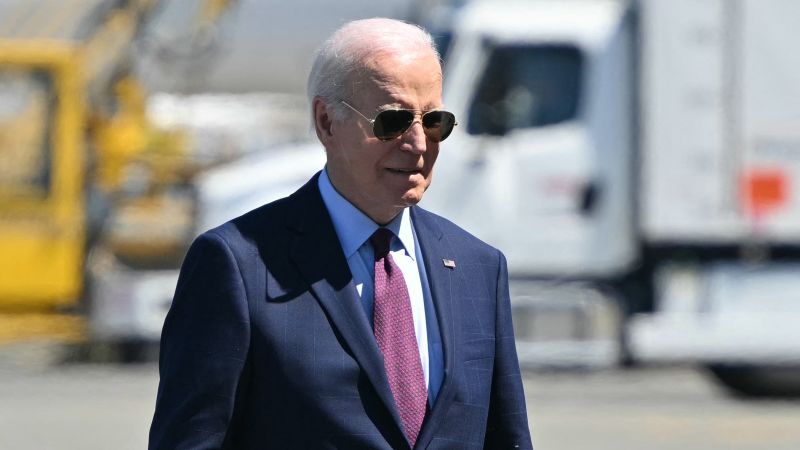
President Joe Biden is increasing tariffs on $18 billion in Chinese imports across a handful of sectors deemed strategic to national security – an attempt to cripple Beijing’s development of critical technologies and instead prioritize US production.
The increases will apply to imported steel and aluminum, legacy semiconductors, electric vehicles, battery components, critical minerals, solar cells, cranes and medical products. The new tariff rates – which range from 100% on electric vehicles, to 50% for solar components, to 25% for all other sectors – will take place over the next two years.
“China’s using the same playbook it has before to power its own growth at the expense of others,” said Lael Brainard, director of the White House National Economic Council. “China’s simply too big to play by its own rules.”
Biden’s predecessor, former President Donald Trump, enacted a sweeping tariff program on $300 billion in Chinese imports during his administration, drawing authority from a provision in US trade law that allows tariffs to be used to stifle competition that would threaten national security interests. That same trade law also requires the effectiveness of such tariff programs to be evaluated every four years, and the Biden administration decision is the result of that study. CNN previously reported on the forthcoming changes.
White House officials said they also redrew the parameters of the program to reflect the Biden administration’s policy priorities, most notably the transition to clean energy.
“China can’t be the only country that produces clean technology for the world we need,” a senior administration official said. “We need diversified, not concentrated, production of our most critical goods and technologies. … That’s the kind of dynamic we think will produce resilient supply chains and clean technology.”
Electric vehicles imported from China will see their tariffs more than quadrupled from 27.5% to 100% – a policy lever meant to challenge Beijing’s practice of encouraging aggressively low pricing by domestic EV manufacturers while levying a 40% tariff on US car imports. Chinese manufacturer BYD’s Seagull electric vehicle retails for roughly $10,000, a fraction of what rival American products cost.
“It was important to have a large enough step-up in the tariffs to ensure that we try to level the playing field,” a second senior administration official said.
Beijing has been known to introduce costly counterpunches. Chinese foreign ministry spokesperson Wang Wenbin told reporters Tuesday that China opposes “the unilateral imposition of tariffs which violate (World Trade Organization) rules, and will take all necessary actions to protect its legitimate rights.”
After Trump unveiled his wide-ranging tariff policy, China slapped tariffs on $101.4 billion in US exports, retaliation that the Brookings Institute estimated affected 294,000 American export-related jobs.
The White House has declined to speculate on how Beijing may hit back now. Officials have pointed to parallel investigations by partners in Europe, Brazil and Turkey as bolstering their position.
“China is producing [goods] at a rate and with a trajectory that’s far in excess of any plausible estimate of global demand,” the first senior administration official said.
Treasury Secretary Janet Yellen and Secretary of State Antony Blinken each raised that point with Chinese counterparts during formal visits to the country in April. Administration officials discussed releasing the changes in April to set the stage for a tariff speech Biden delivered mid-month, but ultimately held off to preserve the diplomatic visits, according to two sources familiar with the matter.
On April 17, Biden spoke at the United Steelworkers headquarters in Pittsburgh, calling for a tripling of tariffs Trump placed on certain steel and aluminum products imported from China, and a new investigation into unfair shipbuilding practices. The Chinese government, Biden argued, is providing state money to Chinese steel companies to make more steel than the economy demands, pushing down the price and making it impossible for other companies to compete.
“They’re not competing,” Biden said of China. “They’re cheating.”
It’s a message that plays favorably across the so-called blue wall, the handful of Midwest manufacturing-heavy states that will be critical for either candidate during an election where trade will once again figure prominently.
It played less favorably across the Pacific, with China’s Ministry of Commerce accusing the US of “false accusations” and “wrong practices.”
CNN’s Sam Fossum contributed to this report.
https://news.google.com/rss/articles/CBMiVGh0dHBzOi8vZWRpdGlvbi5jbm4uY29tLzIwMjQvMDUvMTQvcG9saXRpY3MvYmlkZW4tdGFyaWZmcy1jaGluZXNlLWltcG9ydHMvaW5kZXguaHRtbNIBAA?oc=5
2024-05-14 09:00:00Z
CBMiVGh0dHBzOi8vZWRpdGlvbi5jbm4uY29tLzIwMjQvMDUvMTQvcG9saXRpY3MvYmlkZW4tdGFyaWZmcy1jaGluZXNlLWltcG9ydHMvaW5kZXguaHRtbNIBAA
Tidak ada komentar:
Posting Komentar